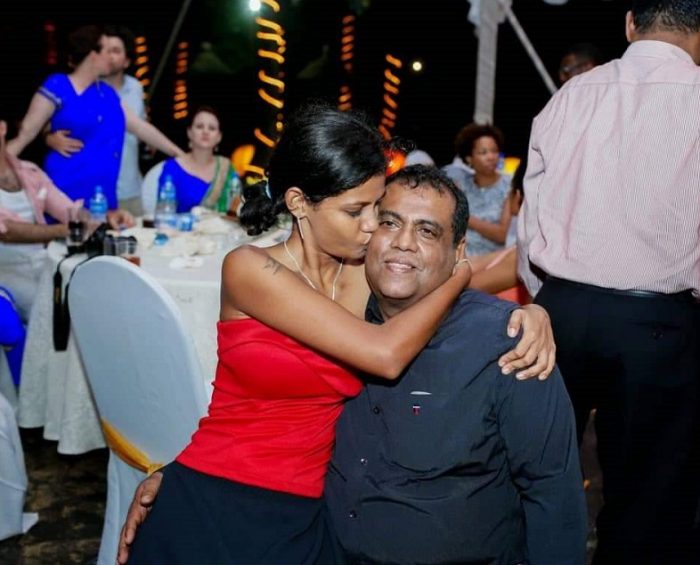On May 23rd, an aunty called to tell me she’d heard that a Britto—a member of my family—had been attacked.
In the midst of waves of panic, I called my father’s phone. I heard a busy tone, and immediately after I received a text message saying, “I’m busy. Can I call you later?”
I exhaled in relief and called my aunty back to tell her my father had texted me and was fine.
As relieved as I was, something didn’t feel right so I started getting dressed to make the 40-minute drive to his home.
My phone rang, interrupting me. It was a cousin I barely talk to, calling to tell me my father had been strangled.
In my head, I saw him seated at his glass dining table with a bandage around his neck. “Where is he?” I asked. “At home,” he replied. “Can I talk to him?” I asked.
“No,” he replied. And my stomach began to sink.
“What’s going on?” I asked, panicked.
“He’s dead, Christina,” was the answer I got.
Those words forever changed my life.
We packed, grabbed our two young boys, and drove to my father’s house. The drive there was a strange one. I kept rambling on and on. I wasn’t sure this was real. My kids snuggled next to me, my husband tried to comfort me, and the tears that my friend Niklas was holding back as he drove us to my father’s home were all real. Yet, I couldn’t convince myself that he was gone—I couldn’t believe that he had been the victim of such a gruesome crime.
We arrived at the lane that was once my childhood playground. Seeing the area cordoned off with police tape was a kick in the chest. I could barely breathe as I ran to his house. The police stopped me and only let me through when I told them I was the victim’s daughter. I could feel their stares of pity as I left my kids at my uncle’s house, which was right next door to where my father was apparently murdered. I ran to his gate, only to have my husband and the police stop me from going inside.
A part of me wanted to go inside and look at him, just so that no part of me could ever be in denial. Another part of me was worried about how I would handle seeing my beloved father’s corpse.
The police needed help identifying his missing things, so they escorted me inside. I saw his bare feet sticking out from the ground floor bedroom—a room he would never go inside. As I walked closer, I saw him bound around the body with his hands tied up in front of him. There was a heaviness in my chest as I noticed the expression on his face: a mask of fury that somehow also had an immeasurable sadness in it.
In that moment, my gut told me he knew who took his life and that his last thought was of my sons.
I felt my legs give out as I crumbled to the ground, but strong arms grabbed me and led me to the staircase.
In his bedroom, everything was as it would have been if he were alive. Nothing was out of place; in fact the sarong he would have worn to have his afternoon nap was thrown on his bed. Downstairs in the kitchen, his previous night’s dinner lay in the fridge.
There were no signs of forced entry, no signs of a struggle, no signs of ransacking, and yet I was told that this was a case of a robbery gone wrong. My father had chili powder thrown in his face, was apparently punched in the face, and hit on the back of the head, yet somehow no one heard a sound.
There are so many questions that still plague us. The days pass by and arrests have been made, but the entire story hasn’t fallen into place.
The thing is, there is no manual on how to survive something like this.
There is nothing to dictate what is acceptable and unacceptable behaviour when a murder occurs in our family.
In the beginning, it was awful. I couldn’t brush my teeth nor did I have it in me to shower. By the time a month had passed, I convinced myself that no one else felt my father’s loss as much as I did. After all, I was his daughter and he had been both mother and father to me.
Whenever someone would tell me how much they missed my father, I would nod and smile. On the inside, I would tell myself that what they were going through was nothing compared to the weight of my grief. Little did I know how wrong I was.
One day, I saw an article on how each of us has a “white wolf” and a “black wolf” within us. The emotions and feelings that we embody are what ultimately decide which wolf within us is stronger. The “black wolf” represents negative feelings and the “white wolf” represents positive feelings.
This post struck a chord in me. I realised that when it came to losing my father, I was feeding my black wolf.
I was angry—angry at myself and angry at whoever took him away.
I was jealous—jealous of people who still had their fathers with them and jealous of people who weren’t dealing with the kind of pain that I was in.
I was sad—every time my children would do something for the first time, rather than celebrate their accomplishment with smiles, I would mourn and howl in anguish over the fact that my father wasn’t around to witness it.
The day I read about the white wolf and the black wolf, I decided that rather than tackle the enormity of facing the rest of my life without my father, I should take it a day at a time. So that is exactly what I did. I started by making sure I did at least one activity a day that was not “murder-related.” It could be going out for coffee with a friend or taking my sons to the beach.
By the time the three-month memorial of my father’s death came around, my older son was acting out less, as he was starting to feel my active presence in my own life, and my husband and I started communicating again, rather than pointing fingers and yelling at each other.
Grief is a strong emotion. We need to let it out. We can’t run from it, but we also can’t let it consume us. If we do, it will take over our entire life like a pesky weed in our garden.
When you live a day at a time, you are more aware of your feelings. Being conscious about your feelings can go a long way, especially when you are dealing with a trauma. The day my younger son walked for the first time, I chose to celebrate it by squealing in delight rather than crying over the fact that my father didn’t witness it. The day my older son turned three, we threw a birthday party for him and made sure he was surrounded by love and smiles. Not hearing my father’s voice that day was especially hard, but rather than cry, I chose to smile and put my best host face on.
One of the hardest things for me to learn to do during the last few months was to forgive. Let me be absolutely clear—I have by no means forgiven my father’s murderer but I have forgiven myself. I have forgiven myself for the times I couldn’t and didn’t do better, not just as his daughter, but as his friend and a fellow citizen of this world. I have forgiven myself for thinking I had more time with him and being so careless and taking everything for granted, especially him.
Learning to forgive myself was what played a monumental role in me not going insane. If I couldn’t forgive myself for the kind of daughter I was while he was alive, I would have ended up obsessing about his murder. It would have been the only thing I focused on, and there’s a limit to what any one mind can take before it snaps.
The other important lesson in all of this was to make sure I didn’t isolate myself. It is so easy to withdraw into one’s self and cut off the outside world when going through a loss. This is dangerous, as immersing ourselves in solitude while dealing with a trauma can make us forget about our physiological needs.
It’s been almost four months since that horrible day. I can say that I have learned a lot from this experience, but there are two main beliefs that have become my mantra, and with this mantra in my mind I somehow wake up in the morning and face the day.
The first is valuing what I have rather than mourning what I’ve lost. I can’t change the past, but I can treasure the present. This isn’t to say that I don’t miss him. I truly do, but I am open to feeling his presence through all that I do. The second is accepting help with carrying my bags of grief. During the first month, I believed no one else’s pain was comparable to mine, but this was naive. My father was a special man who touched many peoples’ lives in immense ways, and his loss has affected people who hardly knew him in ways they couldn’t anticipate. Once my mind became open to this, my heart became open to their grief and I became more accepting of receiving help with my own.
I embarked on this new phase by accepting my husband’s help. Together we share the weight of grief and take it a step at a time. We do our best by living our lives, and by doing that we honour not just my father but all our dead.
We go to court, we go to the police, and we go to lawyers, but we also take our sons to the park, we celebrate their birthdays, and we go for family gatherings. With every new milestone or memory that we make, we carry my father in our hearts. We make sure the parties are a little more organised and that they run longer, because that’s how he wanted them to be. When we want to mourn his loss, we tell stories about him and we smile, because he would never want us to upset his grandsons by crying in front of them.
This is how we live our lives every day, but we still search for the truth that always seems slightly out of reach.
~












Read 2 comments and reply